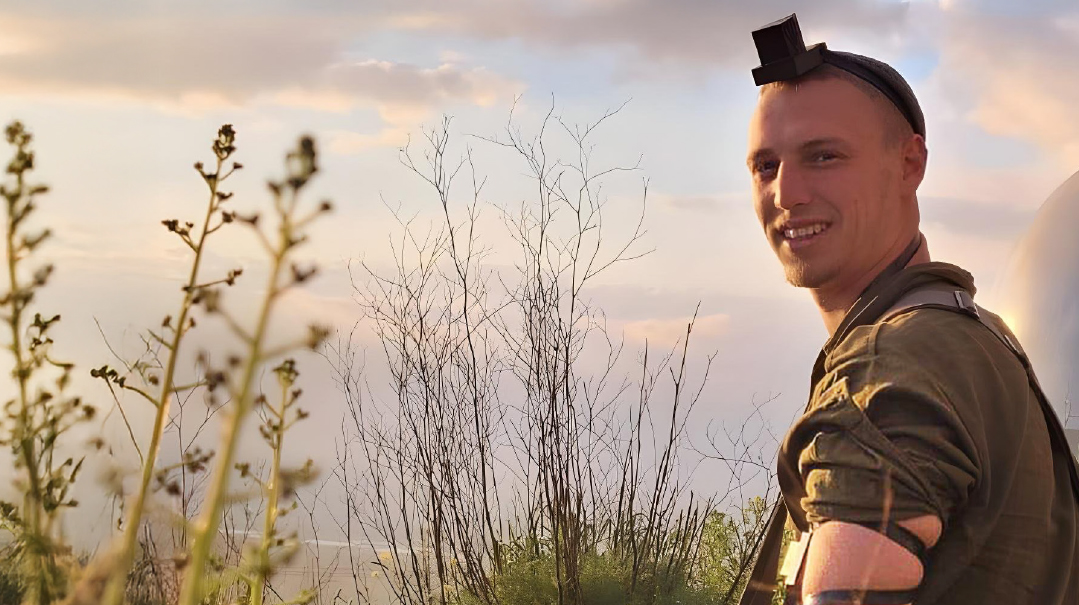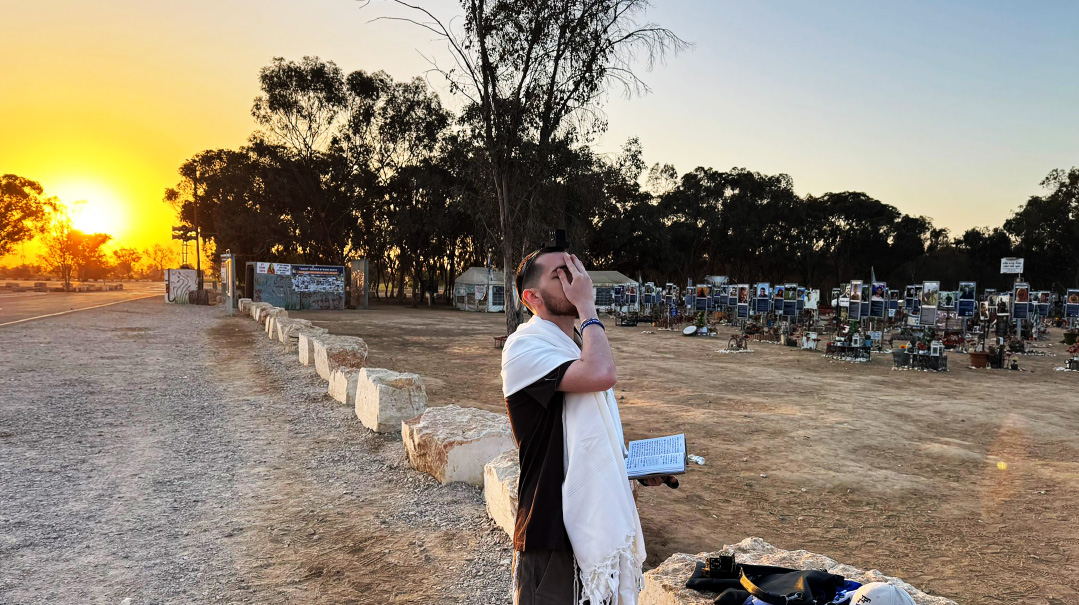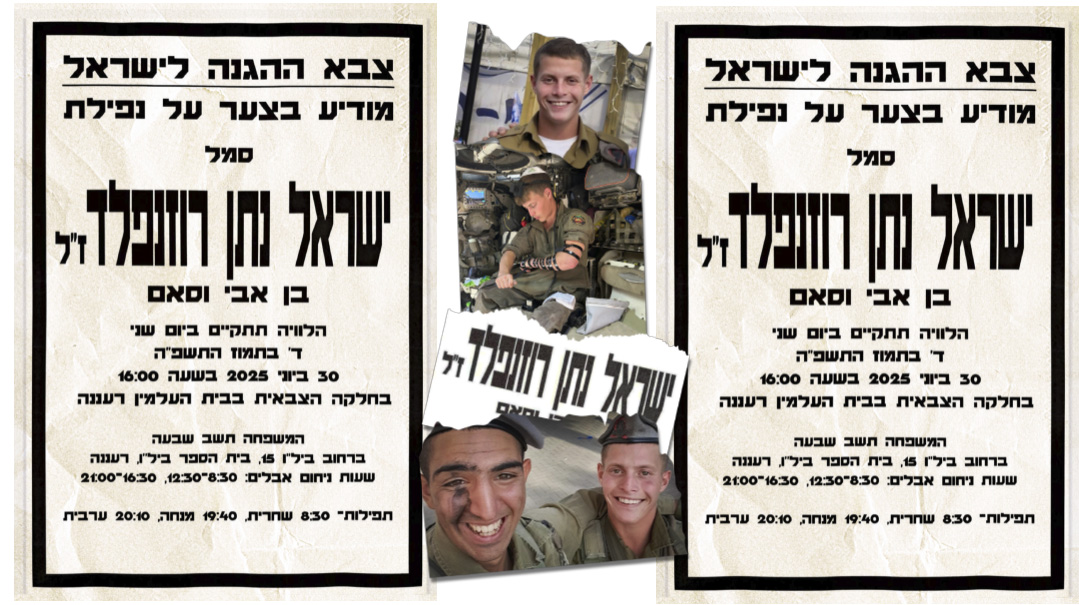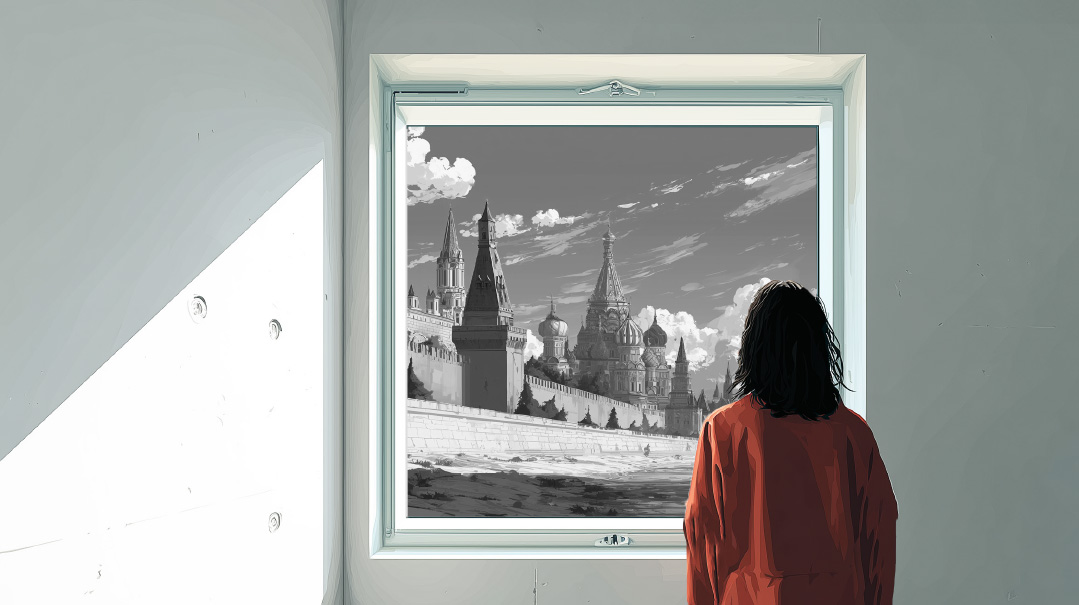When Hope Turned to Heartbreak
| February 25, 2025Against an unimaginable backdrop of human agony, the world is silent. Not a reverent silence. Not a holy silence. An evil and insidious silence

The Last Picture
Yael Zoldan
Four coffins are paraded through streets filled with shouting, jeering demons. A woman, two babies, and a grandfather. A nation falls to its knees, weeping. And as this crippling wave of pain comes shrieking out of Israel, the soulless stir their coffee, lace their shoes, and harden their hearts of stone.
Against an unimaginable backdrop of human agony, the world is silent. Not a reverent silence. Not a holy silence. An evil and insidious silence. This silence hisses like a snake. It sounds like soul rot and complicity. It is the silence of hate.
In the image, circulated worldwide, a woman holding two babies screams without sound. How does a civilized world not scream along with a woman holding two babies? Wrapped hastily in a blanket, pulled from their beds. They are warm and their necks smell like sweet milk. Soft red hair brushes against her jaw. Her mouth is a rictus of agony, her arms clutch the babies tightly. The little boy sucks his pacifier and observes. Terrified, the woman looks wildly around for help, but there is none to be found. The world has gone mad. Bloodthirsty and mad. She wonders if this is a nightmare. She prays that she will awaken.
It is not a nightmare. She does not awaken.
Her husband, a man, surrendered himself to other men believing his sacrifice would yield them mercy. He did not understand that he had given himself over to monsters and monsters have no mercy.
For over a year, we prayed with our hearts in our throats. What do babies do in a dungeon? How do mothers sing songs about sunshine in a tunnel, in a cave, in an underground grave. They are hungry. Do they cry? Do they remember how to laugh? How long can a woman hold two babies in a blanket?
Babies cannot breathe in tunnels. Women cannot be wrested from their homes. And now they are returned to their home, no longer breathing. Never again to smell sweet air, feel warm sunlight on their faces, gaze upon the faces of their loved ones. They return home in boxes; they who should be running, skipping, singing.
Where is our vengeance? How has our fury not rent the sky, buckled the earth, whipped the waves into tsunamis?
Is there any purgatory hot enough for the perpetrators of this violence against the innocent of innocents? Is there any death good enough for monsters who have lost their souls?
The last picture we have of them has become their mournful legacy. But someone took that picture, you know. Some evil villain sought to commemorate the occasion of their capture. In that moment of her horror the air was filled with jeers, with shouts, with praise for a hideous, hateful god. What god is served by the kidnapping and torture of women and children? What god is glorified by the blood of babies?
A god of death and pain and evil. A god of human sacrifice and cruelty. A cowardly god.
And we, who have waited with bated breath, who have pleaded, who have cried, who have shouted, who have hoped against hope for a fairy tale ending for the sweet redheaded boys and their terrified mother and their broken father; what will we do now?
The response to evil silence must not be silence. The world must be forced to hear even if they do not want to listen. The blood of the innocent bubbles on the ground and there must be an accounting.
Shiri, a song. What is Shiri’s song? Ariel and Kfir, her two little lions. Who will hear them roar? Who will hear a woman’s plea? A mother crying for her children?
We must hear her. From inside their locked boxes, we must feel their final pain. We must respond as Jews do, as Jews have always done. With trust in G-d, even when we do not understand Him, because we know He is good and we know that we cannot ever understand Him. With faith, although He does not explain Himself to us.
And we must hold grief and faith like two truths in our pocket and commit ourselves to living in the balance between the two. We must gird ourselves for redemption. We must remind ourselves that the darkest darkness is the moment before dawn.
We must believe that we are living in the moment before dawn.
But even as we reach for hope, we must hold them in our hearts. We must not absolve ourselves of the responsibility to sing their song. It is the song of a woman and two children stolen from our family. We must remember our enemies and wait for G-d’s vengeance. We must wait to sing a new song. Shiri’s song.
The sun will rise again. This dark night will yield to a day of justice, compassion, and good. A day where redheaded children giggle in the sunlight while their mother smiles and an entire nation looks on.
To the silent, soulless world, we leave you with this prayer. You who did not hear their cry, may deafness afflict you. You killers of babies, may your hearts die inside your chests. May you know no joy and no comfort. May you die the deaths of cowards, unloved and unmourned. May your names be forgotten for eternity.
In My Dreams
Shev Zacks Shatzman
IN my dreams, you weren’t home that day. You packed up the car and went away for the weekend, kids sleeping in the backseat.
In my dreams, I never know your name. Or theirs.
Maybe we cross paths at a park as our kids cause chaos on the swings. “Gingi boys,” we’d say with a wry smile. “What can you do?”
You would give your kids cut fruit and offer some to mine, and we would make light conversation.
“Nice to meet you,” we’d say as your husband comes to find you. And he would politely nod, and I would never have borne witness to the moment his heart shattered in a tunnel in Gaza.
And you would gather Ariel and Kfir in your arms, and Yarden would grab the stroller, and I would never imagine that your faces would be the ones I see when I close my eyes. That the mere mention of your name would cause me to sob uncontrollably. That I would mourn you so fiercely.
Shiri, in my dreams, you’re still a stranger.
For These Boys I Have Prayed
Michal Eisikowitz
How do we say goodbye?
How do we say goodbye to the boys who captured our hearts, who lodged deep inside our souls, who consumed our thoughts and tefillos and tears over 500 days of heartbreak and hope?
Ariel and Kfir — I never met you, but your loss is choking, unbearable.
Like so many others, I felt an instant, unshakable bond the moment I saw your picture on that horrific Motzaei Yom Tov.
In that moment, I felt you were mine — but really you were all of ours. As the days turned into months and our desperation gave way to dread, you became the babies of Am Yisrael, the focus of a bottomless well of prayer and longing, the epicenter of a nation’s primal scream.
Davening does not come easy to me. I struggle to detach from the doing and pray with sincerity and depth.
But when I’d picture you, Ariel and Kfir — your angelic eyes, your soft red locks, your sweetness and goodness and chein — it was so easy to cry.
I’d think of the clips that went around. Your mother, tickling your toes, watching you gurgle with delight. Your father, taking you to the local orchard, showing you how to pick an apple from a tree. Your mother, helping you blow out the candles on a perfectly themed birthday cake, painstakingly frosted and sprinkled. Your father, holding you in the family succah, beaming with happiness and pride.
You — Ariel — meeting your baby brother, Kfir, for the first time, gazing upon him with a tenderness that defies words.
Who could not be moved by these two precious boys?
And who could not be moved by your mother’s fierce love — a woman who clearly reveled in her role, savoring each moment and swaddling you with endless affection and care?
Then the images of devastation.
I’d conjure up your mother’s petrified face. You, sucking on your paci, disoriented and confused. Your mother, holding you tight against her chest, ever-protecting, even while surrounded by animals in the guise of men.
I’d find myself howling inside. Hashem, how much longer? When will You bring our babies home?
I’d nurse my (redheaded) baby and daven. When I held him, when I ran my fingers through his uneven tufts of hair, I’d think of your mother and squeeze my eyes.
Shiri, where are you? Can you still hold your boys tight?
Hashem, where are You? Can You show us Your Face?
Can You give this mother the strength to survive?
I davened that wherever you were — in a dank tunnel or bare room or some “innocent” civilian’s home — your Ima could still kiss you from head to toe, bathe you when you got dirty, soothe you when you cried. That you could still snuggle in her arms, feel her warmth, take comfort in her love.
I cried — along with an entire nation.
We davened that one day soon, you would come home, cozy against your mother’s chest, just as you left. Your father, Yarden — surrounded by all of Klal Yisrael — would be waiting for you breathlessly, with outstretched arms and unabashed tears, overflowing with a year’s worth of longing and love. We’d lift you on our shoulders, fill the air with song, and twirl you round and round in a never-ending circle of joy.
Where have our prayers gone?
Where have our mitzvos gone?
I do not know.
I keep going to a dark place. I wonder what your last moments were like. Were you scared? Did you cry? Did you suffer terribly? Was your mother there? Could you have possibly known that every Jewish person on Earth knew your photo and name, had you constantly on their lips and their hearts?
Tzion, Tzion, b’mar tivkeh.
How do we face such blackness and grief?
G-d is big. I am small.
Perhaps one day we will know, understand.
Until then, I will weep.
I will weep for our redheaded babies.
I will weep for a mother who was denied the most basic mercy: to keep her kids safe.
I will weep for an ungodly world, a world where barbarians can pluck infants from their cribs and torture them in captivity and smother the light of a thousand innocent souls.
Goodbye, sweet Kfir.
Goodbye, sweet Ariel.
Goodbye, dear Shiri — the ima who did everything she could to protect you.
You are in a better place now. You play with Elad and Hadas Fogel, with Shalhevet Pas, with Yanky and Leiby and Duvid’l from Warsaw, with the babies torn from their mothers’ arms and crushed into the mortar of Egypt, with the thousands of children across continents and centuries who were murdered al kiddush Hashem.
You sit amid greatness, yet we are broken.
The years will go on, our people will endure — but forever there will be a hole in our hearts, a place where two laughing boys once lived, a hole called Ariel and Kfir.
Orange Nightmare
Rachel Newton
For months and months, your nightmares have been shaded orange. Your random waking thoughts are crackling electric charges that make you jump back if you come too close. The images of certain little faces plastered all over the country slip into the random, careless moments of your day and turn them into guilt trips — or at least reminders. One more hug, another kiss. A whispered I love you.
A baby’s smile, and you’re gone to that place of orange. You pull yourself back, breathless. Away. You tell yourself it will be good, od yoter tov. Everyone says so.
On some orange days, it takes more muscle and grit to fan that dying flame of hope — the flame that is being smothered with reality and statistics and rumors — than any exercise you’ve ever done.
But hope is all you can do as you try to chase away the dark and the questions; the fears.
Because who are we, if not a nation that defies and ignores and triumphs concrete data? That hoists a flag of belief on a mountain of ashes?
Then the day comes, the day that your orange nightmare comes to life. It’s made of hot-red, and black, and scorches you to the depths of your being.
You scrabble through the things you’ve been telling yourself all these months. You hold the flimsy scraps of faith and belief close to you, even though they would barely cover a scrape, let alone heal what’s come apart in you.
And you tell yourself that if this is what has kept us going for two millennia, it will have to keep you going, too.
This, We Mourn
Miriam Milstein
I close my eyes and a collage of images appears: cherub-cheeked Kfir, gumming on a pink elephant; his big brother, Ariel, his hair a mane of tangled red curls as he beams at his baby brother; their mother, Shiri, smiling as she holds her two boys.
And then: Shiri, a look of terror on her face as she cradles her boys, as masked terrorists yank her from her home and toward a hell she cannot imagine.
These are the photos that have dominated our collective consciousness for the past 505 days; these are the pictures found on T-shirts and posters and murals painted on walls. These are the photos that — perhaps more than any others — came to be symbols of this war, of the utter depravity of our enemies, of their cruelty.
**
Years ago, for one of my first writing assignments for Mishpacha, I interviewed the daughter of a Holocaust survivor. “My father was from a village of 30,000 Jews,” she told me. “You know how many survived the war? Two.”
I gasped.
She nodded grimly. “I always tell people that,” she said. “And they always react in the same way. We all know that Hitler killed six million Jews. But six million is a number too vast for our minds to grasp. It’s too big for us to comprehend, it becomes abstract. But when you imagine an entire town, just two people left alive… that, that we can picture. That we can mourn.”
On Simchas Torah, in a heartbeat, with the rapid crack of gunfire and the loud crackle of flames and the bloodthirsty cries of an enemy and the bitter wail of a siren, our world changed forever. Beautiful teenagers gunned down at Nova, families burned alive in their kibbutz homes, soldiers who breathed their last defending their people. Babies. Children. Teenagers. Parents. Grandparents. Our nation suffered losses too vast for our minds to grasp, too big to comprehend.
But there was the Bibas family. Shiri, the lioness desperately grasping her two beautiful boys. This, we could picture. This, we could mourn.
Every mother who has ever cradled her child saw the picture and shuddered. Every parent reacted in horror, imagining. We all saw those two little boys and their mother and father, and said, “This cannot be.” And when the dark news came — in the cruelest manner imaginable — our nation wept.
But the Bibas family were just the symbol of all we have lost, the picture we could latch on to. The picture we could mourn. And so when we cry for the Bibases, we cry for Oded Lipfshitz, too — the great-grandfather who spent his life fighting for peaceful coexistence, only to return from the home of those he’d been fighting for in a coffin. We cry for the hostages who returned weakened and emaciated, after months of torture, and we cry for the hostages who will never return home alive.
We cry for the soldiers who died on October 7 and the ones who died months after being injured and for the young man who was killed trying to catch a grenade with his bare hands and the grandmothers and grandfathers taken hostage and the families who spent a year campaigning for their loved ones’ release from Gaza only to discover they’d been killed on Simchas Torah and for the teens killed at Nova and for the hostages killed in captivity and for the children killed in the streets.
And we cry for a mother, last seen by the world as she stumbled toward darkness, clutching her two beautiful boys tight.
(Originally featured in Family First, Issue 933)
Oops! We could not locate your form.







